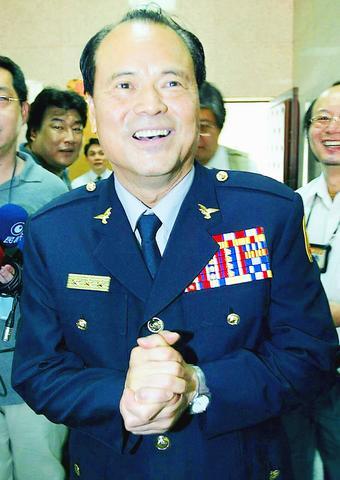The Executive Yuan yesterday approved the appointment of Aviation Police Bureau Commissioner Chang Si-liang (
Outgoing National Police Administration (NPA) Director-General Wang Chin-wang (
Chang's appointment to the top post for police officers was the front-page story for major Chinese-language newspapers on Saturday.

PHOTO: TONY YAO, TAIPEI TIMES
Chang's promotion was high-lighted because he would be the first APB commissioner to take over the top NPA slot.
Chang's advancement is equal to NPA's Criminal Investigation Bureau (CIB) Commissioner Hou You-yi's (
According to the police-promotion system, NPA director-generals have usually been promoted from the job of CIB commissioner, Central Police University president, commissioner of Taipei City Police Department or Kaohsiung City Police Department. All previous NPA director-generals had one thing in common -- they were all criminal investigation experts.
When approached by reporters last Saturday, Chang tried to keep a low profile and said that he has not received any notice of a promotion from his supervisor.
"I actually learned of my `promotion' from the newspapers as well," Chang said. "To lead the 70,000 police officers in this country is definitely not an easy job, but I shall do my best if my superior officers really want me to do it. However, since the Ministry of the Interior has not announced the new NPA director-general, it is not proper for me to comment at this moment."
Like Hou, Chang studied in the criminal investigation department at Central Police University, but he graduated in 1965, 15 years earlier than Hou.
The 62-year-old Chang was born in Hsinchu but grew up in Taipei. After he finished college, he started his police career as a detective in the CIB.
Prior to his taking the APB job in 1999, he served as head of the Chungcheng Second and Taitung precincts of the Taipei City Police Department, as Hualien Police Department commissioner, APB deputy commissioner, Taipei City Police Department deputy commissioner and Third Peace Preservation Police chief.
Chang served as deputy commissioner of Taipei's Police Department under Wang. Hou was the chief officer of the city police's Criminal Investigation Division at that time.
Chang has earned public credit for his criminal investigation and public-relations expertise since his term as APB deputy commissioner.
Between 1993 and 1994, 12 Chinese jetliners were hijacked to this country. Chang was in charge of handling the hijacking cases. He was able to get the hijackers to surrender within a short time after their arrival, thereby assuring the safety of cabin crew and passengers alike and helped them return to China.
He also has a good relationship with the press.
During the 12 hijackings, he was spotlighted by the press because he provided key and immediate information for reporters.
Chang is regarded as an authority on anti-terrorism. After the Sept. 11 attacks on the US, Chang established an anti-terrorism mechanism for all the airports in this country.
With an easy-going personality, Chang enjoys making friends and this has helped him develop good relations and links to politicians and the business community. However, some critics consider him a sycophant.
Among Chang's close friends, the Evergreen Group (長榮集團) Chairman Chang Yung-fa (張榮發) and former NPA director-general Chuang Heng-dai (莊亨岱) are seen as key players behind his latest promotion.

Chinese Nationalist Party (KMT) Chairman Eric Chu (朱立倫), spokeswoman Yang Chih-yu (楊智伃) and Legislator Hsieh Lung-chieh (謝龍介) would be summoned by police for questioning for leading an illegal assembly on Thursday evening last week, Minister of the Interior Liu Shyh-fang (劉世芳) said today. The three KMT officials led an assembly outside the Taipei City Prosecutors’ Office, a restricted area where public assembly is not allowed, protesting the questioning of several KMT staff and searches of KMT headquarters and offices in a recall petition forgery case. Chu, Yang and Hsieh are all suspected of contravening the Assembly and Parade Act (集會遊行法) by holding

PRAISE: Japanese visitor Takashi Kubota said the Taiwanese temple architecture images showcased in the AI Art Gallery were the most impressive displays he saw Taiwan does not have an official pavilion at the World Expo in Osaka, Japan, because of its diplomatic predicament, but the government-backed Tech World pavilion is drawing interest with its unique recreations of works by Taiwanese artists. The pavilion features an artificial intelligence (AI)-based art gallery showcasing works of famous Taiwanese artists from the Japanese colonial period using innovative technologies. Among its main simulated displays are Eastern gouache paintings by Chen Chin (陳進), Lin Yu-shan (林玉山) and Kuo Hsueh-hu (郭雪湖), who were the three young Taiwanese painters selected for the East Asian Painting exhibition in 1927. Gouache is a water-based

Taiwan would welcome the return of Honduras as a diplomatic ally if its next president decides to make such a move, Minister of Foreign Affairs Lin Chia-lung (林佳龍) said yesterday. “Of course, we would welcome Honduras if they want to restore diplomatic ties with Taiwan after their elections,” Lin said at a meeting of the legislature’s Foreign Affairs and National Defense Committee, when asked to comment on statements made by two of the three Honduran presidential candidates during the presidential campaign in the Central American country. Taiwan is paying close attention to the region as a whole in the wake of a

OFF-TARGET: More than 30,000 participants were expected to take part in the Games next month, but only 6,550 foreign and 19,400 Taiwanese athletes have registered Taipei city councilors yesterday blasted the organizers of next month’s World Masters Games over sudden timetable and venue changes, which they said have caused thousands of participants to back out of the international sporting event, among other organizational issues. They also cited visa delays and political interference by China as reasons many foreign athletes are requesting refunds for the event, to be held from May 17 to 30. Jointly organized by the Taipei and New Taipei City governments, the games have been rocked by numerous controversies since preparations began in 2020. Taipei City Councilor Lin Yen-feng (林延鳳) said yesterday that new measures by